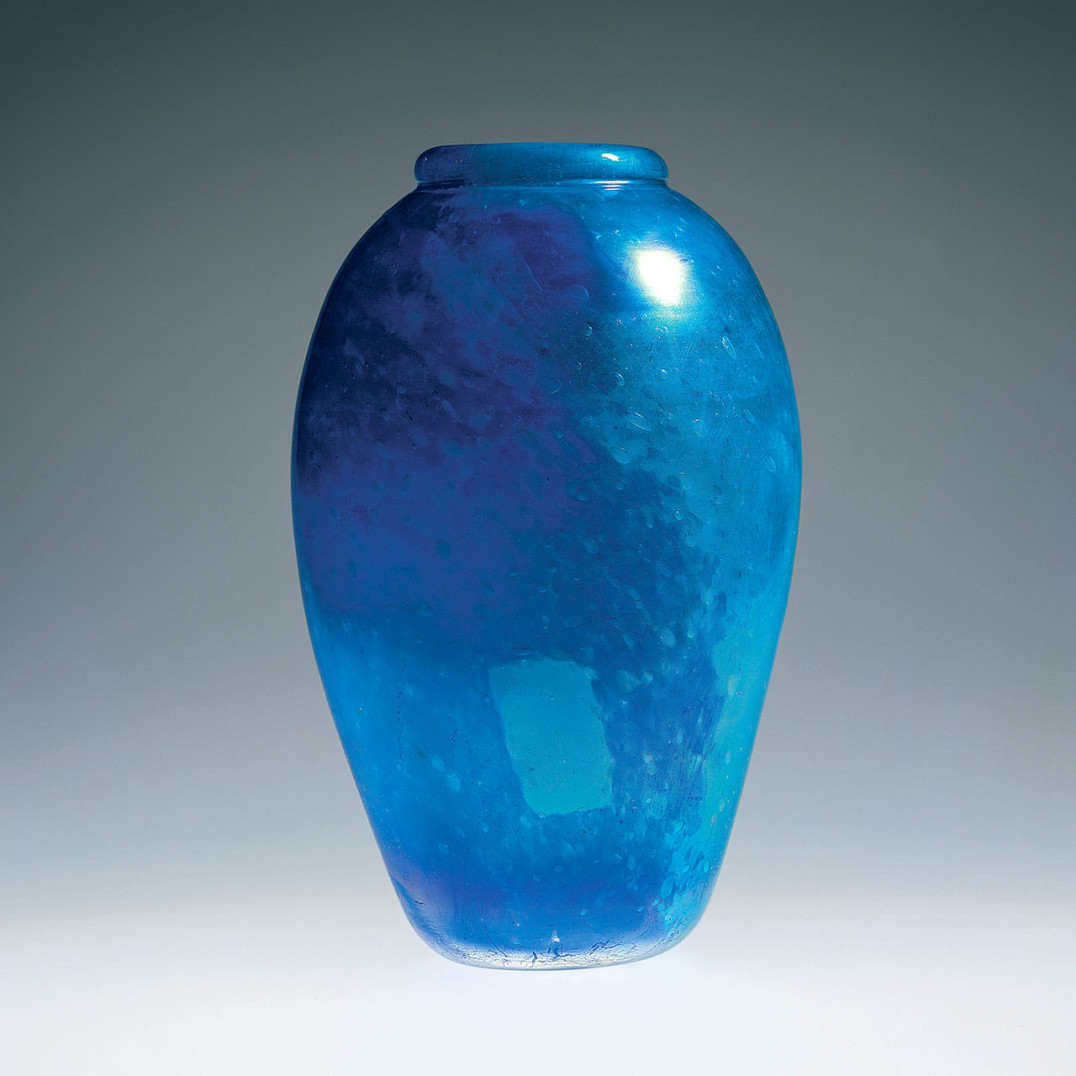
Dino MartensA macie, ca. 1950
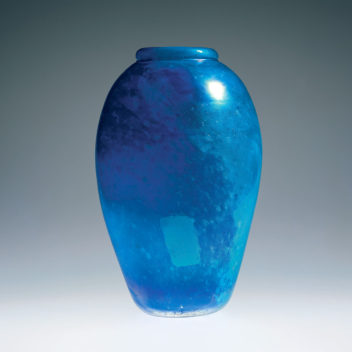
Dino MartensA macieAureliano Toso Vetri Decorativi, ca. 1950
Vase in clear trasparente glass
with inclusions of blue glass grit.
13 in. high (33 cm)
Exhibitions:
2001, Milan, Murano: Vetri dalla Collezione Olnick Spanu, Spazio Oberdan.
Bibliography and comparative texts:
M. Heiremans, 1993, n. 153;
M. Heiremans, 1996, n. 77;
M. Heiremans, 1999, nn. 16, 18;
Olnick Spanu, 2001, n. 150.
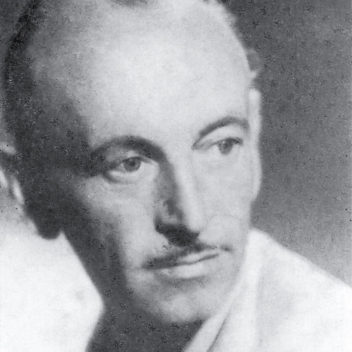
Dino Martens 1894–1970
Painter and designer Dino Martens was born in Venice, where he attended the Accademia di Belle Arti. In the mid '20s he moved to Murano, where for a short time he was a partner and decorator for the glass factory S.A.L.I.R. Later he worked as a designer for Salviati & C. and its successor Andrea Rioda. His Novecento-style paintings were exhibited at the Biennale di Venezia between 1924 and 1930. Upon his return from the African War in 1939, he became artistic director of the glass factory Aureliano Toso. From 1946 to 1960, Martens designed an incredible series of works for Toso. Using traditional Venetian techniques, he was able to obtain strikingly original multicolored effects combined with particularly daring asymmetric shapes. They included the compositions of glass rods called zanfirici; colorful pieces composed with irregular shadings, and inserts of avventurina and rods of filigrana called Oriente; as well as the unusual shapes of the Sommersi with battuto finish and the inside cased with multicolored glass. His collaboration with the Aureliano Toso ended in 1963.
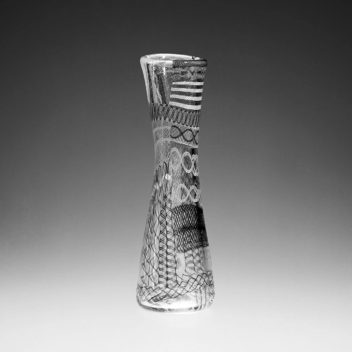
Aureliano Toso Vetri Decorativi 1932–
Founded in 1938 by Aureliano Toso, Aureliano Toso Vetri Decorativi boasted the artistic direction of Dino Martens, a painter from Murano, who worked with the company until 1965. The works created by Martens brought widespread acclaim at the major exhibitions of decorative arts, the colors being of particular interest. In 1962, the company sought the collaboration of outside consultants like Enrico Potz. After 1966, the artistic direction was entrusted to Gino Poli, who designed, among others, the collection A Solchi Colorati. Later, the company turned to the production of glass parts for lighting, which it still produces today.
Dino MartensA macie, ca. 1950
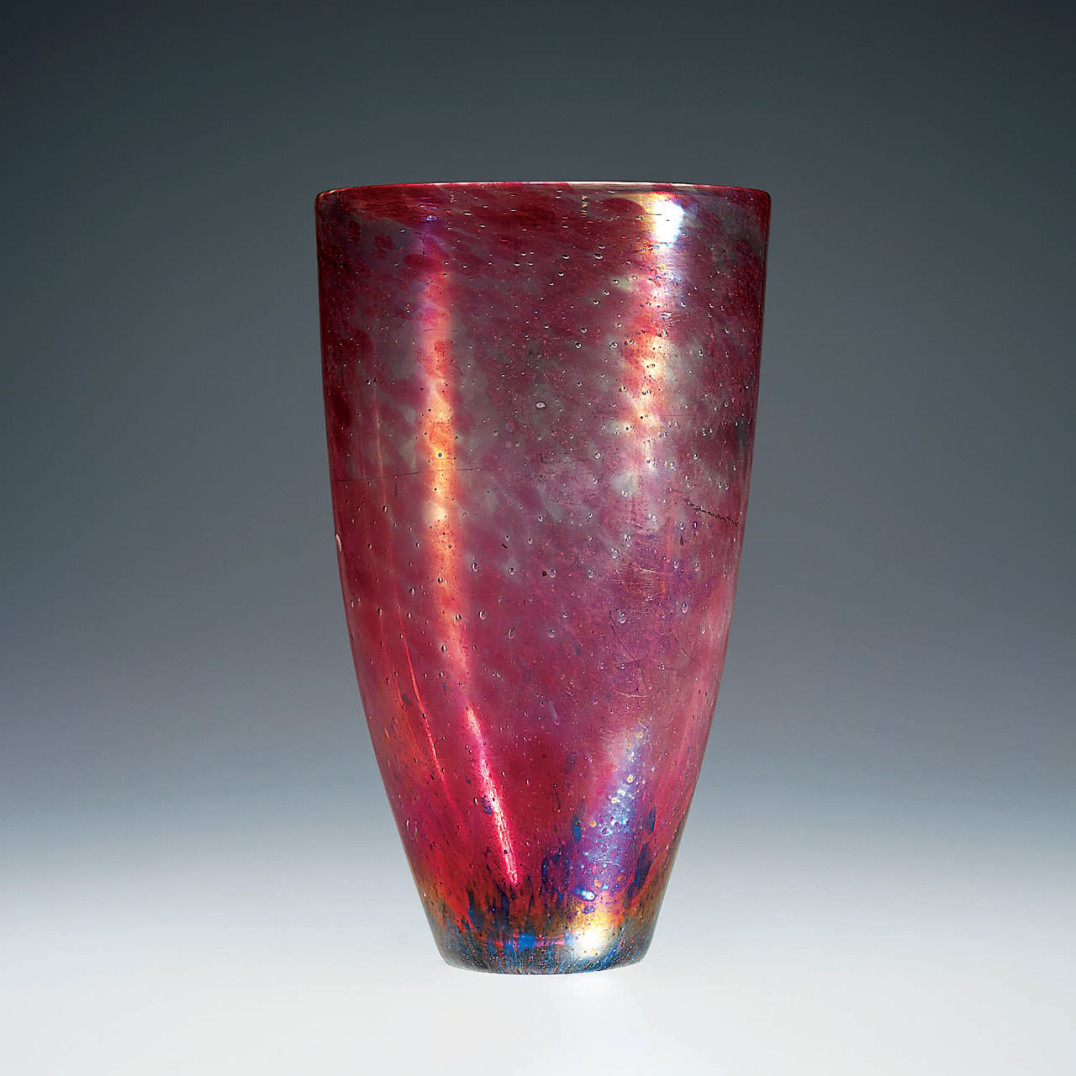
Dino MartensA macie, ca. 1950
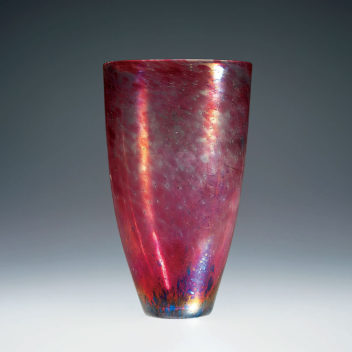
Dino MartensA macieAureliano Toso Vetri Decorativi, ca. 1950
Vase in clear trasparente glass with inclusions of ruby glass grit.
11 7/16 in. high (29 cm)
Exhibitions:
2001, Milan, Murano: Vetri dalla Collezione Olnick Spanu, Spazio Oberdan.
Bibliography and comparative texts:
M. Heiremans, 1993, n. 153;
M. Heiremans, 1996, n. 77;
M. Heiremans, 1999, nn. 16, 18;
Olnick Spanu, 2001, n. 149.

Dino Martens 1894–1970
Painter and designer Dino Martens was born in Venice, where he attended the Accademia di Belle Arti. In the mid '20s he moved to Murano, where for a short time he was a partner and decorator for the glass factory S.A.L.I.R. Later he worked as a designer for Salviati & C. and its successor Andrea Rioda. His Novecento-style paintings were exhibited at the Biennale di Venezia between 1924 and 1930. Upon his return from the African War in 1939, he became artistic director of the glass factory Aureliano Toso. From 1946 to 1960, Martens designed an incredible series of works for Toso. Using traditional Venetian techniques, he was able to obtain strikingly original multicolored effects combined with particularly daring asymmetric shapes. They included the compositions of glass rods called zanfirici; colorful pieces composed with irregular shadings, and inserts of avventurina and rods of filigrana called Oriente; as well as the unusual shapes of the Sommersi with battuto finish and the inside cased with multicolored glass. His collaboration with the Aureliano Toso ended in 1963.

Aureliano Toso Vetri Decorativi 1932–
Founded in 1938 by Aureliano Toso, Aureliano Toso Vetri Decorativi boasted the artistic direction of Dino Martens, a painter from Murano, who worked with the company until 1965. The works created by Martens brought widespread acclaim at the major exhibitions of decorative arts, the colors being of particular interest. In 1962, the company sought the collaboration of outside consultants like Enrico Potz. After 1966, the artistic direction was entrusted to Gino Poli, who designed, among others, the collection A Solchi Colorati. Later, the company turned to the production of glass parts for lighting, which it still produces today.
Dino MartensA macie, ca. 1950
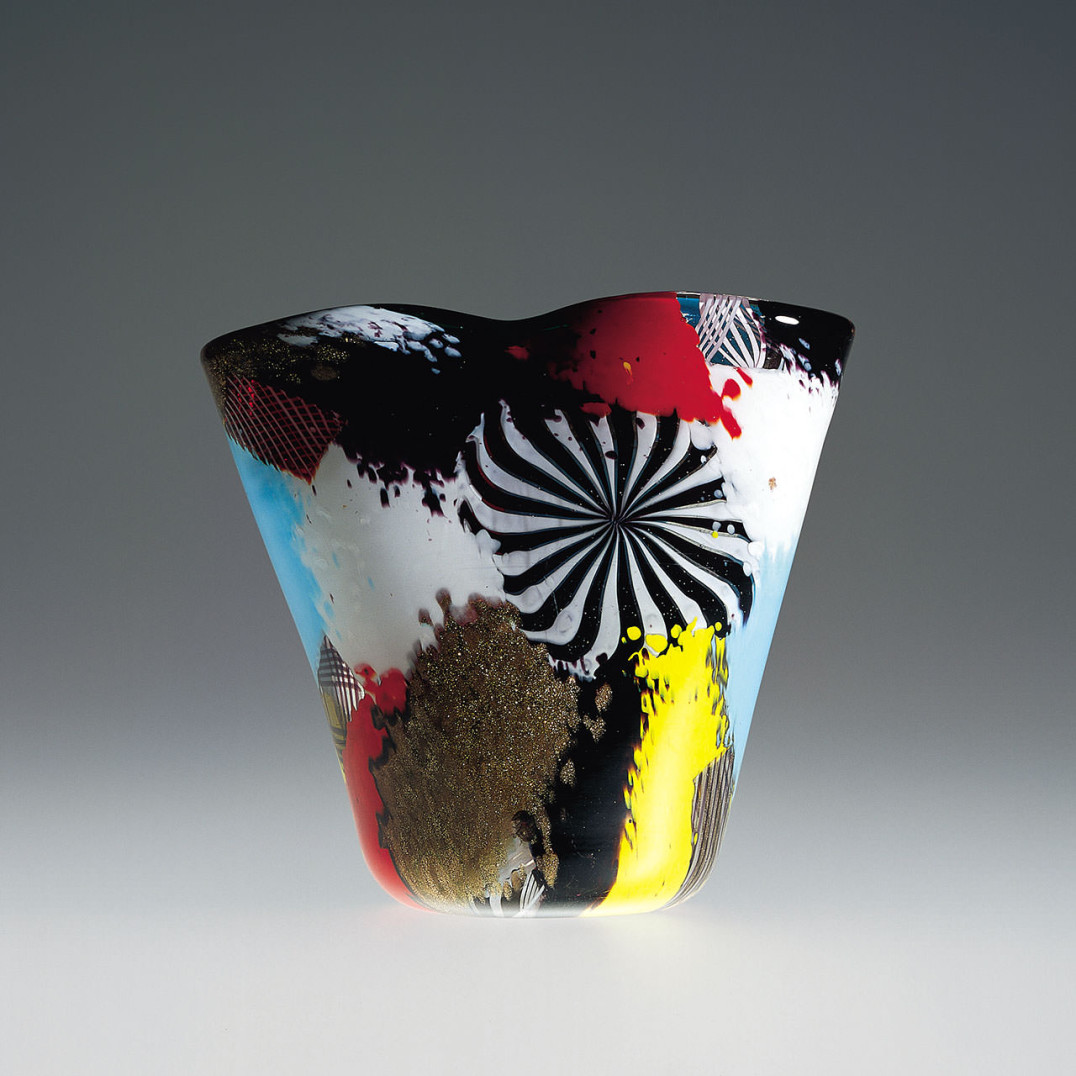
Dino MartensOriente, 1952
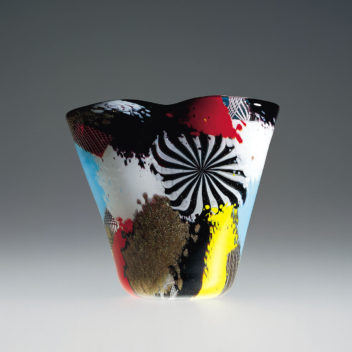
Dino MartensOrienteAureliano Toso Vetri Decorativi, 1952
Vessel from the Oriente series. This model is also known as Nabucco. Made with irregular patches of multicolored glass, inclusions of avventurina and canes of zanfirico and reticello.
This vessel
conforms with model n. 3121 of
the manufacturer’s catalogue.
8 1/4 in. high (21 cm)
Exhibitions:
1952, Venice, 26th Biennale Internazionale d’Arte;
2000, New York, Venetian Glass, Museum of Arts & Design;
2001, Milan, Murano: Vetri dalla Collezione Olnick Spanu, Spazio Oberdan.
Bibliography and comparative texts:
Mille anni…, 1982, n. 615;
Intérieurs ’50, 1983, n. 137;
W. Neuwirth, 1987, n. 95;
M. Heiremans, 1989, n. 136;
R. Barovier Mentasti, 1992, n. 104;
M. Heiremans, 1993, nn. 155, 157, 161, 162;
M. Barovier, 1994, nn. 27-29;
Venezia e la Biennale…, 1995, n. 486;
F. Deboni, 1996, nn. 152, 153;
M. Heiremans, 1996, nn. 122-124;
H. Ricke, E. Schmitt, 1996, nn. 203-206;
L. M. Barbero, 1997, p. 231;
M. Barovier, 1999, p. 217;
M. Heiremans, 1999, n. 57b;
Olnick Spanu, 2000, n. 110-111;
Olnick Spanu, 2001, n. 148.

Dino Martens 1894–1970
Painter and designer Dino Martens was born in Venice, where he attended the Accademia di Belle Arti. In the mid '20s he moved to Murano, where for a short time he was a partner and decorator for the glass factory S.A.L.I.R. Later he worked as a designer for Salviati & C. and its successor Andrea Rioda. His Novecento-style paintings were exhibited at the Biennale di Venezia between 1924 and 1930. Upon his return from the African War in 1939, he became artistic director of the glass factory Aureliano Toso. From 1946 to 1960, Martens designed an incredible series of works for Toso. Using traditional Venetian techniques, he was able to obtain strikingly original multicolored effects combined with particularly daring asymmetric shapes. They included the compositions of glass rods called zanfirici; colorful pieces composed with irregular shadings, and inserts of avventurina and rods of filigrana called Oriente; as well as the unusual shapes of the Sommersi with battuto finish and the inside cased with multicolored glass. His collaboration with the Aureliano Toso ended in 1963.

Aureliano Toso Vetri Decorativi 1932–
Founded in 1938 by Aureliano Toso, Aureliano Toso Vetri Decorativi boasted the artistic direction of Dino Martens, a painter from Murano, who worked with the company until 1965. The works created by Martens brought widespread acclaim at the major exhibitions of decorative arts, the colors being of particular interest. In 1962, the company sought the collaboration of outside consultants like Enrico Potz. After 1966, the artistic direction was entrusted to Gino Poli, who designed, among others, the collection A Solchi Colorati. Later, the company turned to the production of glass parts for lighting, which it still produces today.
Dino MartensOriente, 1952
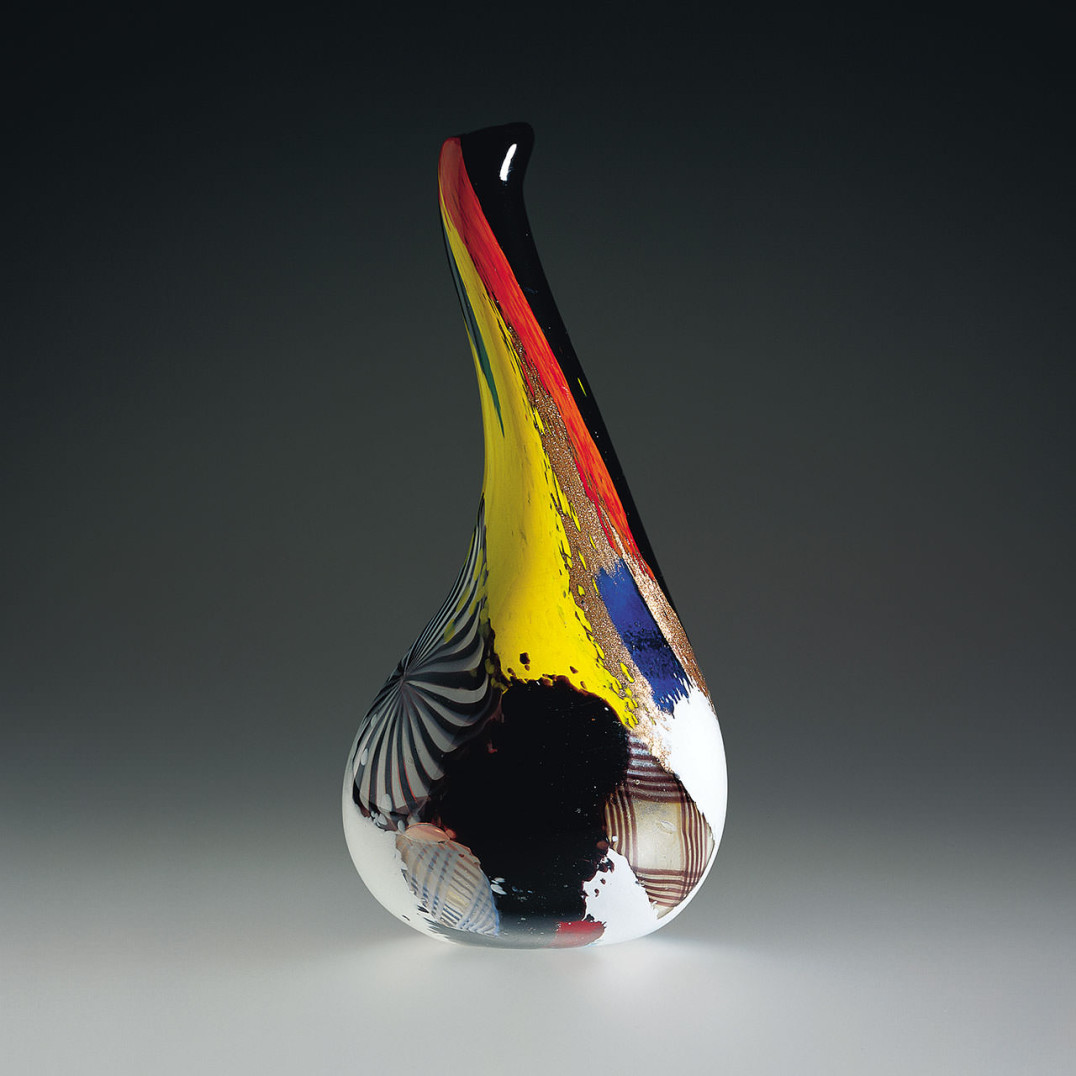
Dino MartensOriente, 1952
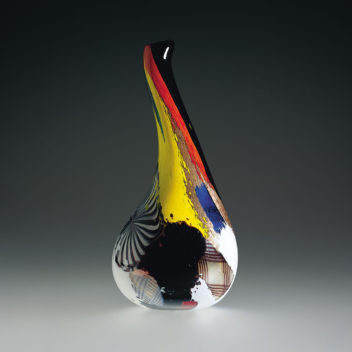
Dino MartensOrienteAureliano Toso Vetri Decorativi, 1952
Vessel from the Oriente series. This model, also known as Olaf, made with irregular patches of multicolored glass, inclusions of avventurina and canes of zanfirico and reticello.
Vessel conforms with model n. 3122 of the manufacturer’s catalogue.
14 in. high (35.5 cm)
Exhibitions:
1952, Venice, 26th Biennale Internazionale d’Arte;
2000, New York, Venetian Glass, Museum of Arts & Design;
2001, Milan, Murano: Vetri dalla Collezione Olnick Spanu, Spazio Oberdan.
Bibliography and comparative texts:
Mille anni…, 1982, n. 615;
Intérieurs ’50, 1983, n. 137;
W. Neuwirth, 1987, n. 95;
M. Heiremans, 1989, n. 136;
R. Barovier Mentasti, 1992, n. 104;
M. Heiremans, 1993, nn. 155, 157, 161, 162;
M. Barovier, 1994, nn. 27–29;
Venezia e la Biennale…, 1995, n. 486;
F. Deboni, 1996, nn. 152, 153.
M. Heiremans, 1996, nn. 122-124;
H. Ricke, E. Schmitt, 1996, nn. 203-206;
L.M. Barbero, 1997, p. 231;
M. Barovier, 1999, p. 217;
M. Heiremans, 1999, n. 43;
Olnick Spanu, 2000, n. 110-111;
R. Reif, New York Times, 2000, p. 39;
Olnick Spanu, 2001, n. 147.

Dino Martens 1894–1970
Painter and designer Dino Martens was born in Venice, where he attended the Accademia di Belle Arti. In the mid '20s he moved to Murano, where for a short time he was a partner and decorator for the glass factory S.A.L.I.R. Later he worked as a designer for Salviati & C. and its successor Andrea Rioda. His Novecento-style paintings were exhibited at the Biennale di Venezia between 1924 and 1930. Upon his return from the African War in 1939, he became artistic director of the glass factory Aureliano Toso. From 1946 to 1960, Martens designed an incredible series of works for Toso. Using traditional Venetian techniques, he was able to obtain strikingly original multicolored effects combined with particularly daring asymmetric shapes. They included the compositions of glass rods called zanfirici; colorful pieces composed with irregular shadings, and inserts of avventurina and rods of filigrana called Oriente; as well as the unusual shapes of the Sommersi with battuto finish and the inside cased with multicolored glass. His collaboration with the Aureliano Toso ended in 1963.

Aureliano Toso Vetri Decorativi 1932–
Founded in 1938 by Aureliano Toso, Aureliano Toso Vetri Decorativi boasted the artistic direction of Dino Martens, a painter from Murano, who worked with the company until 1965. The works created by Martens brought widespread acclaim at the major exhibitions of decorative arts, the colors being of particular interest. In 1962, the company sought the collaboration of outside consultants like Enrico Potz. After 1966, the artistic direction was entrusted to Gino Poli, who designed, among others, the collection A Solchi Colorati. Later, the company turned to the production of glass parts for lighting, which it still produces today.
Dino MartensOriente, 1952
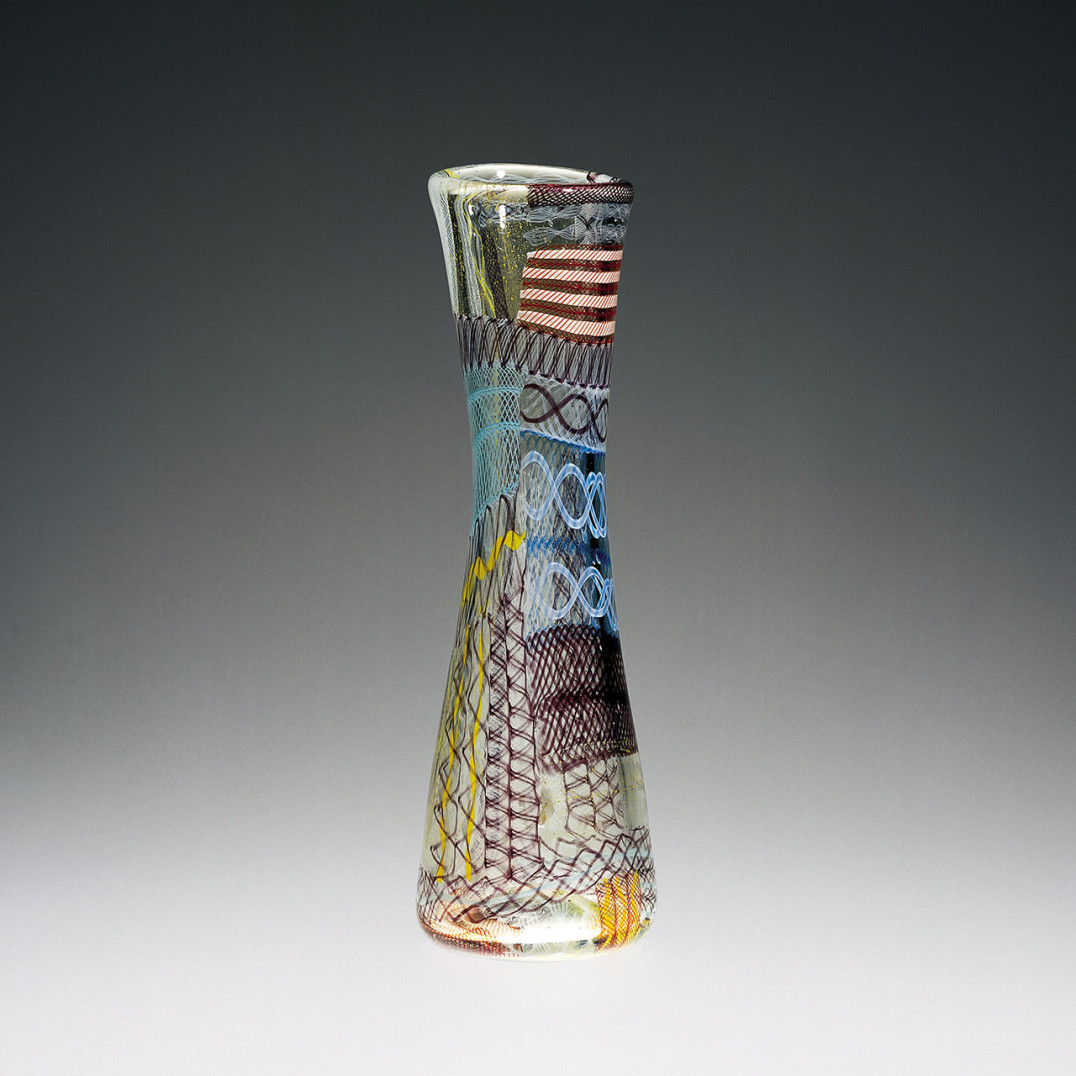
Dino MartensZanfirico, 1952
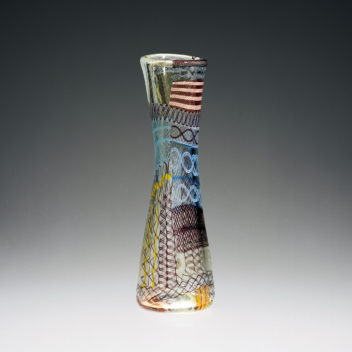
Dino MartensZanfiricoAureliano Toso Vetri Decorativi, 1952
Vase from the zanfirico series, the clear glass decorated with multicolored canes of zanfirico and reticello glass.
Original paper label: Anita Kott Importer.
14 3/16 in. high (36 cm)
Exhibitions:
1952, Venice, 26th Biennale Internazionale d’Arte;
2000, New York, Venetian Glass, Museum of Arts & Design;
2001, Milan, Murano: Vetri dalla Collezione Olnick Spanu, Spazio Oberdan.
Bibliography and comparative texts:
R. Aloi, 1952, n. 20;
R. Aloi, 1955, p. 31;
M. Heiremans, 1989, nn. 146, 147;
M. Heiremans, 1993, nn. 156, 166;
M. Barovier, 1994, n. 26;
M. Barovier, R. Barovier Mentasti, A. Dorigato, 1995, n. 97;
F. Deboni, 1996, p. 63, n. 150;
M. Heiremans, 1996, n. 103;
Olnick Spanu, 2000, n. 109;
Olnick Spanu, 2001, n. 146.

Dino Martens 1894–1970
Painter and designer Dino Martens was born in Venice, where he attended the Accademia di Belle Arti. In the mid '20s he moved to Murano, where for a short time he was a partner and decorator for the glass factory S.A.L.I.R. Later he worked as a designer for Salviati & C. and its successor Andrea Rioda. His Novecento-style paintings were exhibited at the Biennale di Venezia between 1924 and 1930. Upon his return from the African War in 1939, he became artistic director of the glass factory Aureliano Toso. From 1946 to 1960, Martens designed an incredible series of works for Toso. Using traditional Venetian techniques, he was able to obtain strikingly original multicolored effects combined with particularly daring asymmetric shapes. They included the compositions of glass rods called zanfirici; colorful pieces composed with irregular shadings, and inserts of avventurina and rods of filigrana called Oriente; as well as the unusual shapes of the Sommersi with battuto finish and the inside cased with multicolored glass. His collaboration with the Aureliano Toso ended in 1963.

Aureliano Toso Vetri Decorativi 1932–
Founded in 1938 by Aureliano Toso, Aureliano Toso Vetri Decorativi boasted the artistic direction of Dino Martens, a painter from Murano, who worked with the company until 1965. The works created by Martens brought widespread acclaim at the major exhibitions of decorative arts, the colors being of particular interest. In 1962, the company sought the collaboration of outside consultants like Enrico Potz. After 1966, the artistic direction was entrusted to Gino Poli, who designed, among others, the collection A Solchi Colorati. Later, the company turned to the production of glass parts for lighting, which it still produces today.